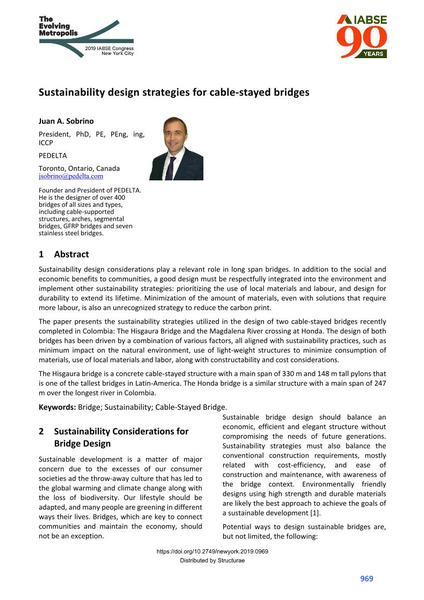Sustainability design strategies for cable-stayed bridges

|
|
|||||||||||
Bibliografische Angaben
| Autor(en): |
Juan A. Sobrino
|
||||
|---|---|---|---|---|---|
| Medium: | Tagungsbeitrag | ||||
| Sprache(n): | Englisch | ||||
| Tagung: | IABSE Congress: The Evolving Metropolis, New York, NY, USA, 4-6 September 2019 | ||||
| Veröffentlicht in: | The Evolving Metropolis | ||||
|
|||||
| Seite(n): | 969-975 | ||||
| Anzahl der Seiten (im PDF): | 7 | ||||
| DOI: | 10.2749/newyork.2019.0969 | ||||
| Abstrakt: |
Sustainability design considerations play a relevant role in long span bridges. In addition to the social and economic benefits to communities, a good design must be respectfully integrated into the environment and implement other sustainability strategies: prioritizing the use of local materials and labour, and design for durability to extend its lifetime. Minimization of the amount of materials, even with solutions that require more labour, is also an unrecognized strategy to reduce the carbon print. The paper presents the sustainability strategies utilized in the design of two cable-stayed bridges recently completed in Colombia: The Hisgaura Bridge and the Magdalena River crossing at Honda. The design of both bridges has been driven by a combination of various factors, all aligned with sustainability practices, such as minimum impact on the natural environment, use of light-weight structures to minimize consumption of materials, use of local materials and labor, along with constructability and cost considerations. The Hisgaura bridge is a concrete cable-stayed structure with a main span of 330 m and 148 m tall pylons that is one of the tallest bridges in Latin-America. The Honda bridge is a similar structure with a main span of 247 m over the longest river in Colombia. |
||||
| Stichwörter: |
Brücke Schrägseilbrücke Nachhaltigkeit
|
||||

